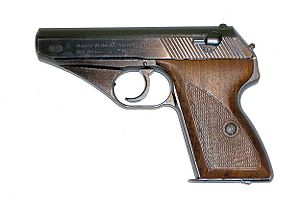Mauser HSc
| Mauser HSc | |
|---|---|
| general information | |
| Country of operation: | Germany |
| Developer / Manufacturer: | Mauser works in Oberndorf |
| Manufacturer country: | Germany |
| Production time: | 1937 to 1945 (then again in 1964 - mid-1980s) |
| Weapon Category: | Self-loading pistol |
| Furnishing | |
| Overall length: | 152 mm |
| Total height: | 111 mm |
| Weight: (unloaded) | 0.64 kg |
| Sight length : | 125 mm |
| Barrel length : | 86 mm |
| Technical specifications | |
| Caliber : |
7.65 × 17 mm , 9 × 17 mm short |
| Possible magazine fillings : | 8 (7.65 mm) 7 (9 mm) cartridges |
| Ammunition supply : | Bar magazine |
| Number of trains : | 6th |
| Twist : | right |
| Closure : | Mass closure |
| Charging principle: | Recoil loader |
| Lists on the subject | |
The Mauser HSc is a pistol that was created shortly before the Second World War . It was intended primarily for use by police forces , but was then widely used by military units in Germany during the war.
origin
The very successful pistol models from Walther, such as the PP and the PPK, put Mauser under pressure to design comparable pistols. In particular, the clamping trigger of the Walther models ensured brisk sales, which reduced Mauser's market share in domestic business. This resulted in several prototypes, of which the third was finally produced in series. The designation HSc of the weapon is made up of the words Hahn-Selbstspanner-Pistole c .
Technology and commitment
The Mauser HSc was developed with civil use in mind. This resulted in the high technical manufacturing standards and the special safety features of the weapon. Just removing the magazine blocks the trigger. This prevents shots from being released from fully loaded pistols when they are to be unloaded and there is still a cartridge in the chamber . The weapon was only designed for the relatively weak cartridges 7.65 mm x 17 (0.32 Browning) and 9 mm x 17 (0.38 Browning), so that a simple ground lock was sufficient. All corners were rounded to allow the Mauser to be carried concealed, the cock sticking out only a little.
At the beginning of the war, not only the police but also the armed forces began to be interested in the weapon. In total, more than a quarter of a million copies were made, with the main items being delivered to the army and navy. Due to the high demand, production was soon rationalized, with polishing and burnishing of the metal surfaces giving way to simple phosphating .
post war period
After the end of the war, the Mauser works fell under the administration of the French occupying forces, which continued production, including HSc weapons. The systems were later dismantled. In the 1970s, the Mauser company relaunched the pistol, among other things as the HSc-80 with increased magazine capacity, but soon abandoned production. The HSc served as the basis for another new development, namely the HK 4 from Heckler & Koch in Oberndorf.
literature
- Chris McNab, Small arms of the 20th and 21st centuries , Neuer Kaiser Verlag, new edition from 2009
Web links
- Mauser HSC (Engl.)
